I had never seen a more efficient and happier group than Teriyaki Boy’s crew of deaf employees.
They exuded warmth and sincerity as they attended to customers’ needs, delivering every request with great service. Why then, given this kind of character and performance, are PWDs deemed incapable of working in the foodservice industry?
“Many people with disabilities are actually high-functioning. It’s just that they were never given opportunities to contribute to society,” says John Amante, Teriyaki Boy and Sizzlin’ Steak’s chief operating officer.
Teriyaki Boy and Sizzlin’ Steak have been hiring PWD employees, particularly deaf individuals, since 2018. They started with 10 employees who were designated at the back of the house, handling bar and sushi stations across branches all over the country. Max’s Group Inc. (MGI), the group behind these two restaurants, wanted to create a workplace where employees feel safe and included, even if they are a PWD.
“Their productivity is very high. It actually encourages their other colleagues. The other workers will say, “Uy, ang dami na nilang nagagawa. Tayo nagkukuwentuhan pa.” Aside from that, their workmanship is always better, they are always focused,” says Amante.

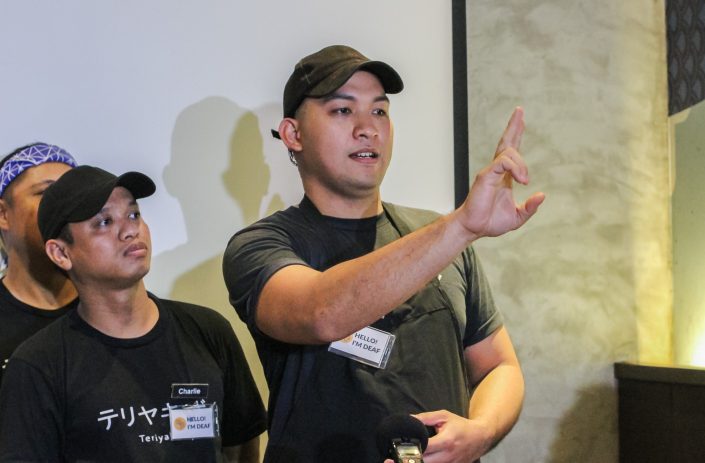
Amante notes that having PWDs in the company will give them a sense of fulfillment that, for the longest time, society has deprived them of: economic independence. As an inclusive workplace, MGI sees hiring PWDs as blind trust. As long as they are able to pass the test and train under programs with partners like the De La Salle-College of Saint Benilde (DLS-CSB) and Leonard Cheshire Disability Philippines Foundation Inc. (LCDPF), they have all the foundation they need to start working.
The workload itself, according to Amante, is demanding. However, this only fuels employees to work harder and once the management sees that they’re doing well at the salad bar or sushi station, there’s no stopping PWD employees from moving to the hot kitchen. “It’s more important that society recognizes them. When people start recognizing that they can actually contribute to themselves, their families and society, that’s when they’ll realize that they’re abled beings,” says Amante.
Leaving no one behind
LCDPF caters to all types of disabilities. This includes the deaf, the blind as well as people with learning disabilities. The organization sources candidates by collaborating with local governments, welfare offices, and schools to help employable PWD individuals.
There are three core programs. The first is Inclusive Education, which focuses on helping children with disabilities reach their highest educational and social potential. The Young Voices Program, which caters to youths with disabilities aged 15 to 25 years old, hones leadership skills to empower them in terms of advocating for their rights. Finally, the Economic Empowerment Program that gives PWDs access to employment and livelihood opportunities.
“Companies really have to give opportunities to people with disabilities. It all starts with changing the mindset—let’s believe that they have abilities, then we give them opportunities and the right support,” says Hazel Joy Borja.
“That’s the beauty of our program—no one is left behind. [If] you are interested [in going into] wage employment, we can provide you the needed support based on the assessment that we do. Prior to giving them capital assistance, we do a lot of training for them like entrepreneurship, livelihood projects, and income-generating activities they want to engage in. We don’t give them money, but we give them materials to support their chosen livelihood,” says Hazel Joy Borja, programmes manager of LCDPF.
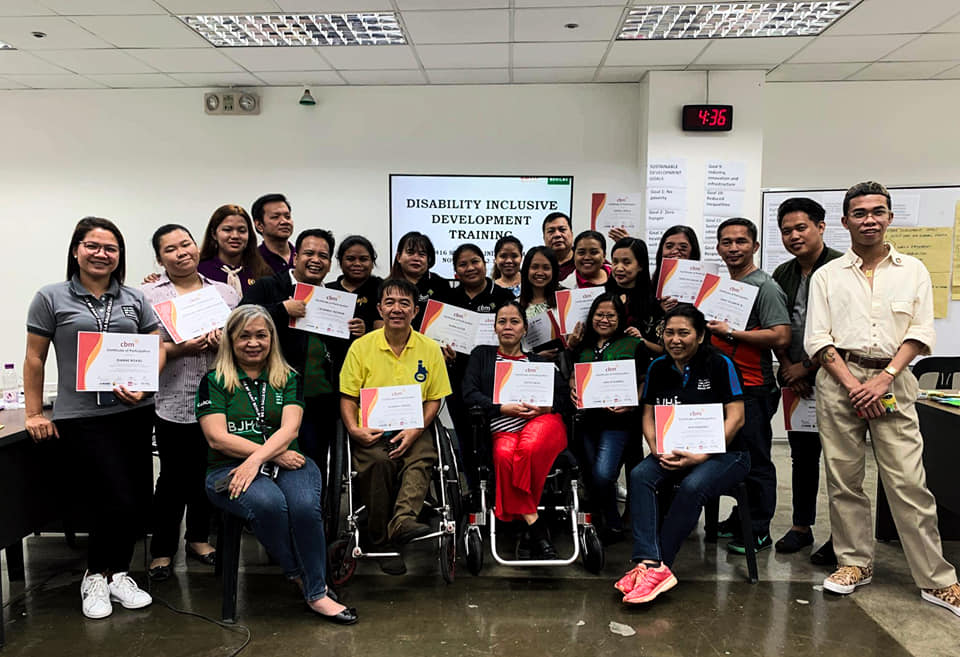
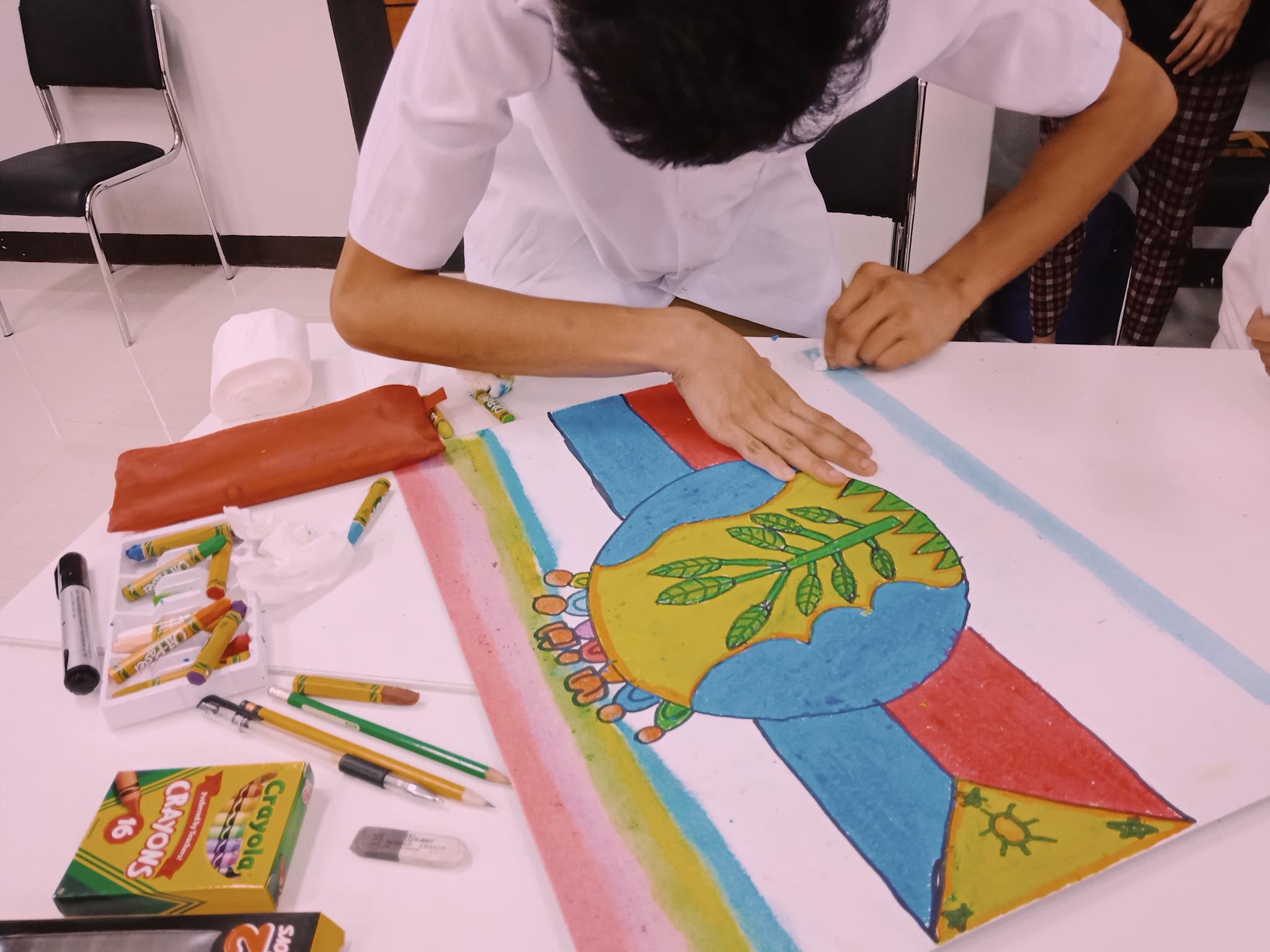
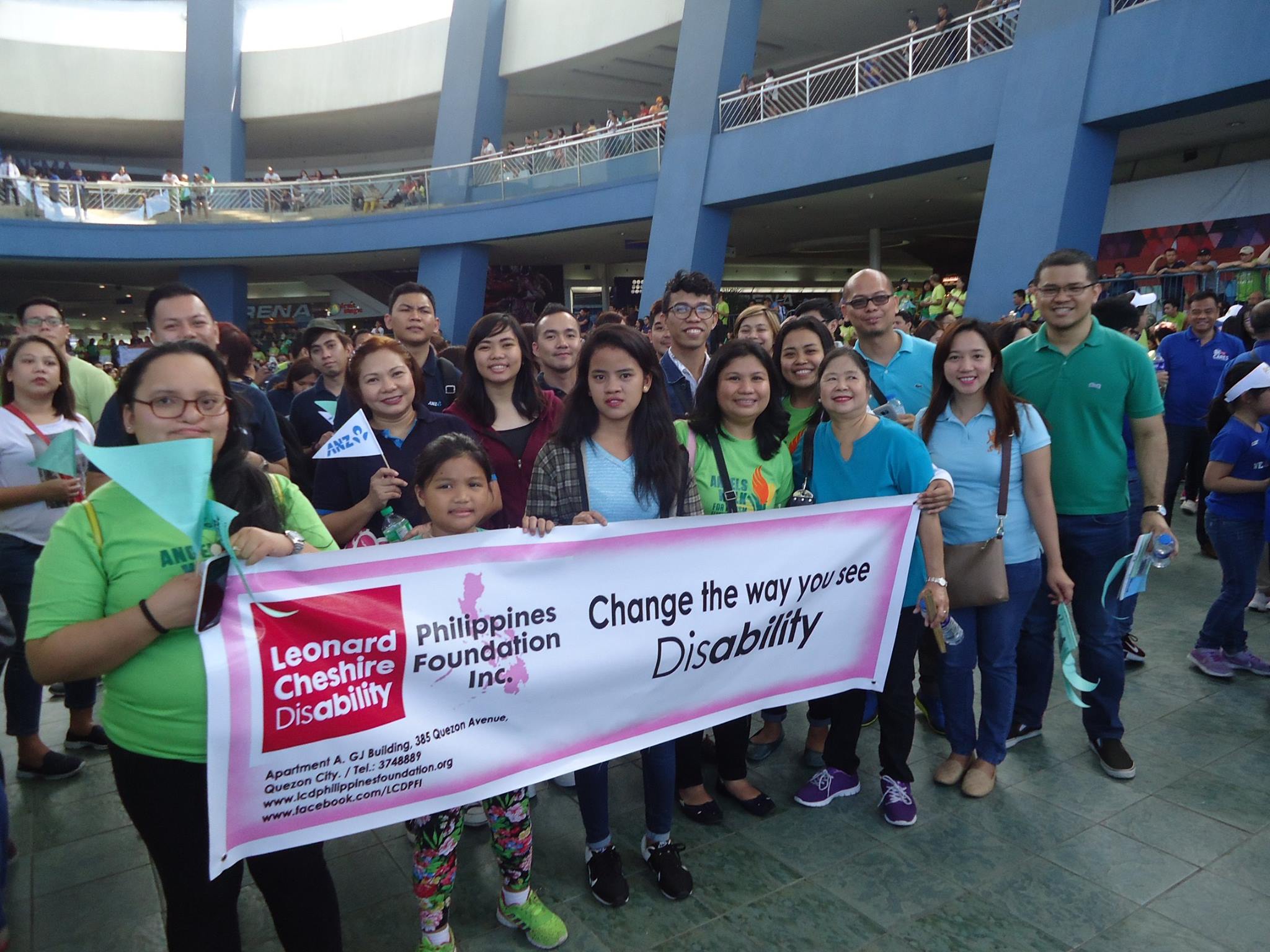
As much as possible, they want candidates to gain skills through apprenticeship programs and supplemental training. While facilitating their placement, candidates undergo pre-employment workshops that focus on personality development, personal care, and even mock interviews.
Those who aren’t able to enter wage employment are assessed and given opportunities to start small businesses. They encourage group businesses to establish their network in their own communities, incorporating what they have learned in their business development and financial management training.
“People should have an inclusive mindset. We should not discriminate [against] people because of their disability. That’s the type of attitudinal barrier that we have to break. Companies really have to give opportunities to people with disabilities. It all starts with changing the mindset—let’s believe that they have abilities, then we give them opportunities and the right support,” says Borja.
It’s all about understanding what deafness is and what their identity is. Much like how we grew up not knowing that we are Filipinos until we entered school.
For Borja, if companies are able to unlock the full potential of PWDs, they will see that there are actually many benefits in doing so. There will be low attrition rates as PWDs are dedicated to their jobs. They know how hard it is to find a job so they value every opportunity they are given.
Why companies should hire PWD employees
DLS-CSB is the only university in Asia that offers a degree program in Deaf Studies. According to Oscar Sherlo Reyes, director of School of Deaf Education and Applied Studies’ Center for Partnership and Development, it’s about understanding what deafness is and what their identity is.
There are three tracks that allow students to be employed: entrepreneurship, visual and graphic arts, and business outsourcing management. It’s part of their partnership with organizations to model their curriculum according to the demands of the industry. This secures the students’ qualifications once they apply for jobs.
“We really journey with the companies and we’re not promising heavens. When they hire the deaf, it’s not going to be easy. We have to be transparent with them. The learning curve will be quite steep, especially if they don’t know sign language yet. But once they surpass that learning curve, [things] become natural for the company and the deaf can easily communicate with the workers already,” says Oscar.
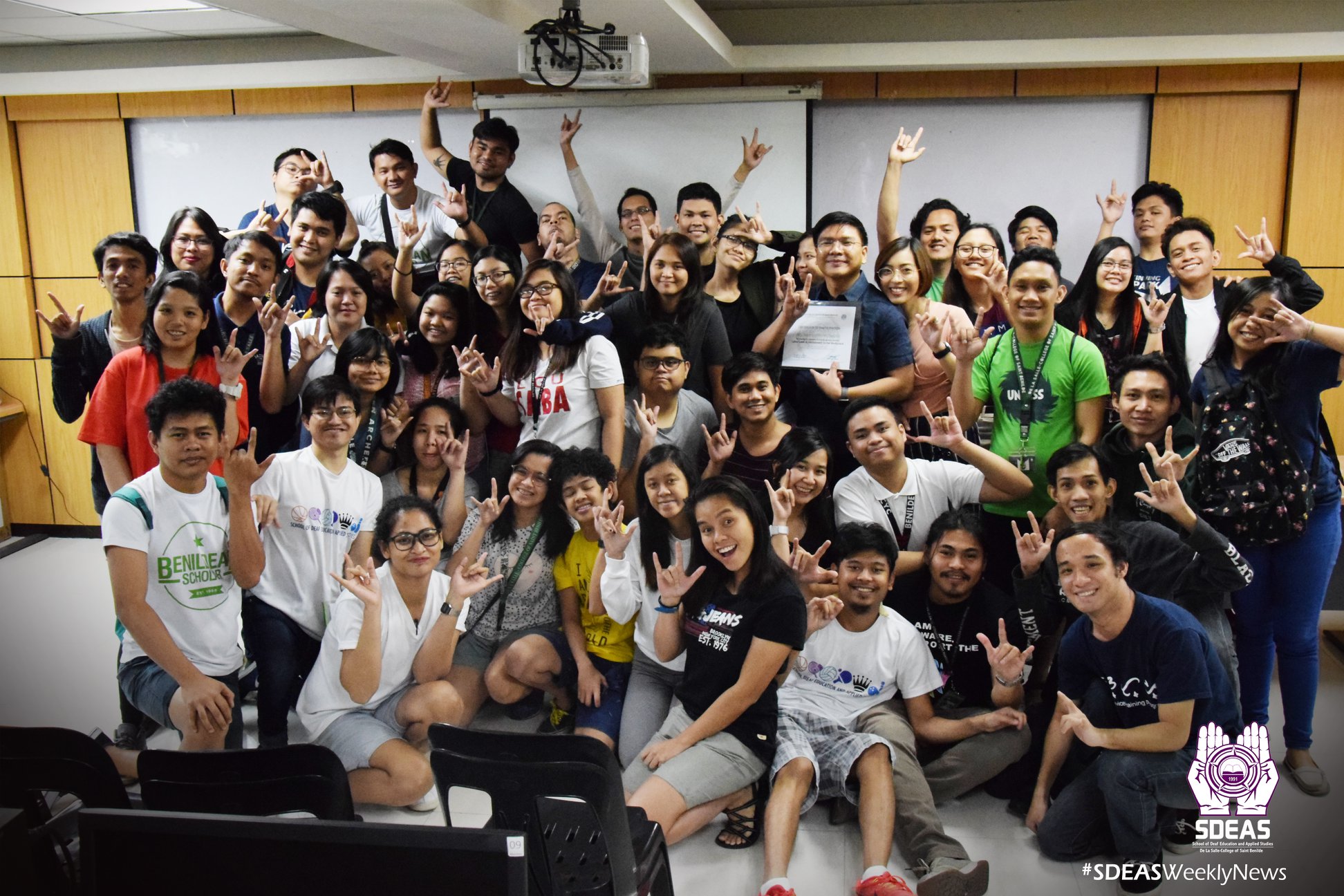
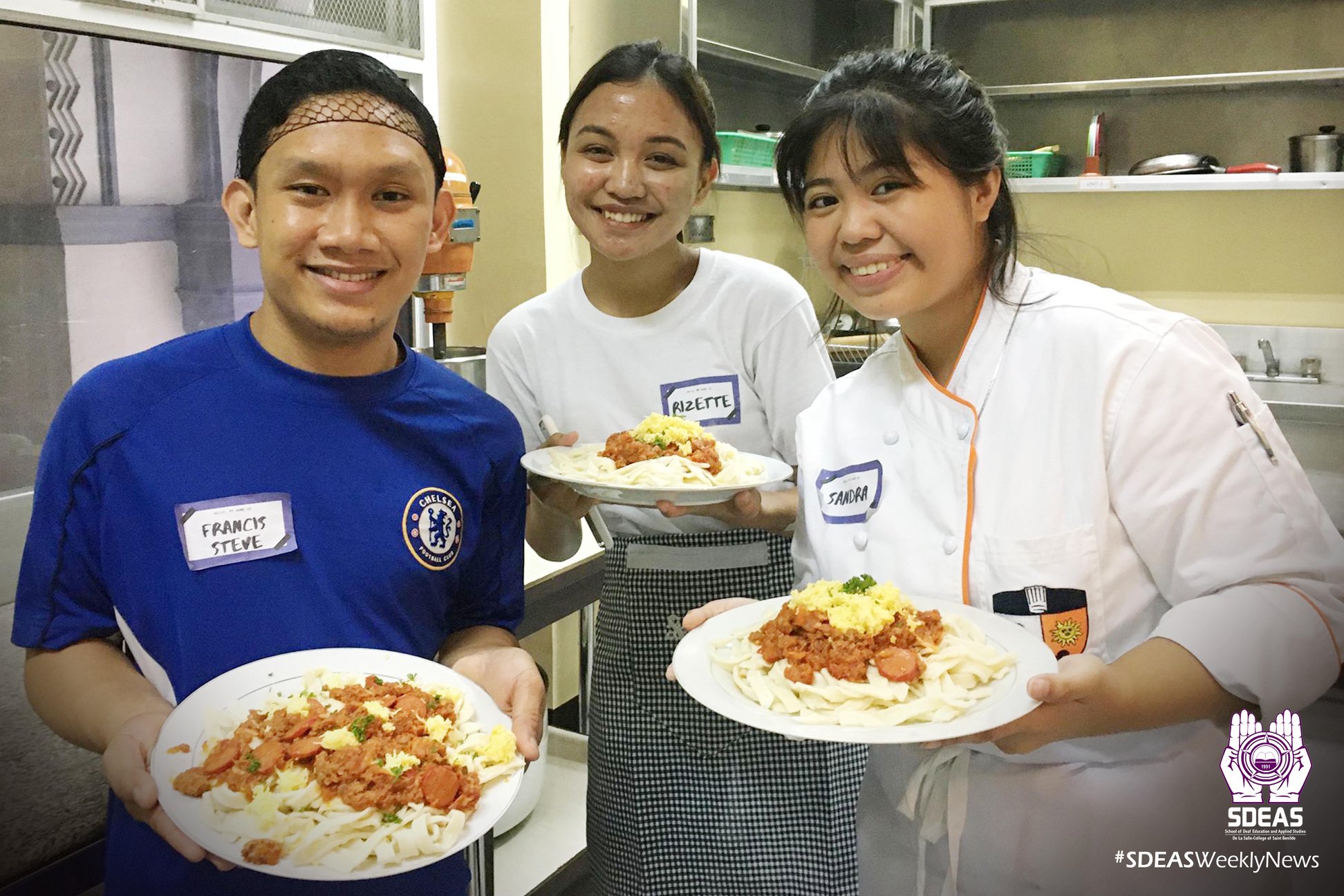
As Oscar explains, hiring PWDs allows companies to expand their market. “Your company may be diverse, but never inclusive. There could be a lot of PWD employees in the company, but if they don’t feel that they are valued, that’s nothing. It’s more of providing opportunities regardless of who you are,” says Oscar.
“Your company may be diverse, but never inclusive. There could be a lot of PWD employees in the company, but if they don’t feel that they are valued back, that’s nothing. It’s more of providing opportunities regardless of who you are,” says Reyes.
Oscar however cautions that empowerment can be misunderstood. PWDs, even ordinary persons, could misconceive empowerment as entitlement. To be clear, empowerment is advocating for rights and independence, not simply expecting what is due to them. It’s about learning the kind of strategic thinking that solves problems on your own rather than simply demanding solutions.
Rising through the ranks
Instead of creating separate concepts that are helpful, trending, and refreshing, Francis Carl Reyes, chief executive officer of Caravan Food Group Inc. (CFGI), decided to put up an establishment that embodied all three values. He recalls a time in which, as a teenager, he visited a store where all the employees weren’t minding him—except for one deaf employee.
“Of all the people in that shop, it was one deaf guy who really showed me the epitome of customer service. He went above and beyond the difficult. And then I left the shop. I didn’t really buy anything, but what I took home was that these people are nice. I wanted to recreate the experience in this concept and so I decided to hire deaf people. I wanted everyone to feel the warmth and [realize] how capable these deaf people are,” says Francis.
But, according to him, many organizations catering to the PWD didn’t take them seriously because at that time, there weren’t any concepts like it. Others were cautious due to instances in which the PWD employees were taken advantage of. Now, most of their shops are managed entirely by deaf employees, as much as 80 percent including those with Down syndrome.
They also have two marketing assistants, a first for DLS-CSB’s Deaf Studies, in their team that work on usual marketing tasks. It isn’t just front of house work anymore, they are also given the opportunity to work inside the office.
“Their productivity is really high compared to those who don’t really appreciate the job. They really take care of you and the company,” adds marketing manager Kristine Francisco.
Currently, CFGI provides leadership training centered on providing good customer service on top of reviews on inventory management and quality control in hopes of promoting their PWD employees to supervisors, managers, and human resources officers. For them, their employees aren’t only there as service crew. They have the potential to rise through the ranks.
“They feel welcome in the branch because they are not the only PWD. That’s sometimes the case when companies hire PWD employees, they feel out of place or that they don’t belong. We make sure that they [feel that they] belong here,” says Francis. “They’re fit for the job as front liners of the F&B industry. What the company has to do though is to make sure that they have a system to accommodate PWDs on how they will be able to do the job. It’s up to the company to make it work and the will to do so.”
Challenging the PWD spectrum
At nine in the morning, Gian Carlo opened the doors of Pancake House and greeted me warmly. I told him I was going to be the one to interview him during his break time. As he guided me to a booth where the president of Autism Society Philippines (ASP) Mona Magno Veluz was waiting, I noticed him take out a piece of paper. I watched him read carefully. I wasn’t the only one who was looking forward to this interview after all.
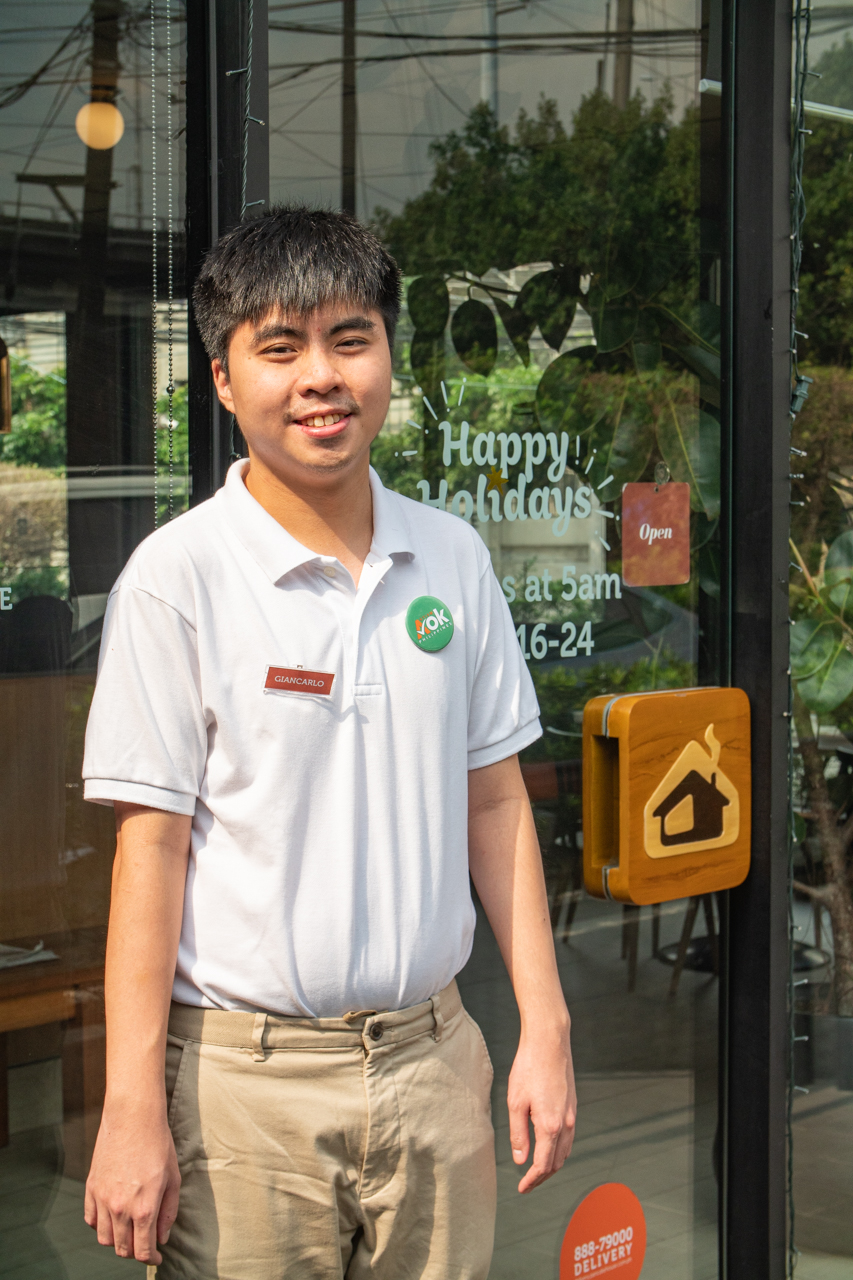
Carlo is the first employee with autism spectrum disorder to be hired by MGI. He started working as a crew member in Pancake House in October 2019. Prior to that, ASP helped him land a job in SM Market as a retail sales associate and in COMELEC as a clerk for the Overseas Workers Division.
“My experience in SM Market is fun and exciting. The tasks that I did are cleaning up the shelves, putting items in their proper places, folding clothes, going to the redemption area so that when the customer comes in they will claim the items, and greeting customers. My recent task was bagging,” says Carlo.
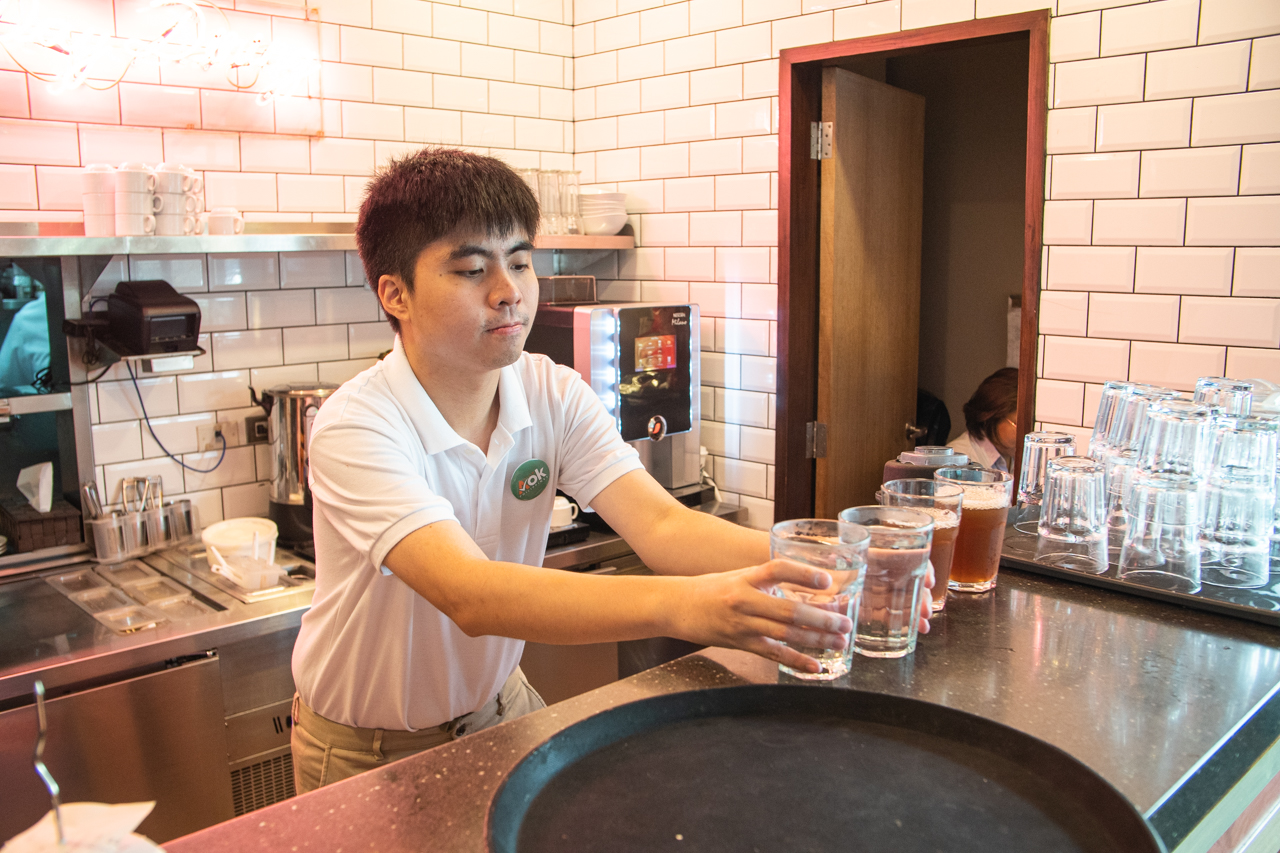
That was the first question that wasn’t included on the list I sent prior to the interview. He was sure and passionate about sharing his experience in his previous jobs that he didn’t even bother to check if it was included in the script he had.
He studied Bachelor of Science in Hotel and Restaurant Management and had his on-the-job training in a shipping company and a hotel. Being particularly interested in cooking, he usually prepares his specialty dishes for his family and friends. This includes sisig, turbo-broiled chicken, and other Western cuisine.
“I would like to tell other autistic adults that they can work and earn a living with the help of a support system like our parents and family, our job coaches, advocacy organizations like the Autism Society Philippines and employers like Pancake House. We need to work hard and continue to believe in our potential to be successful. When I make mistakes, I just try harder to do things correctly, focus on my job and believe in myself,” says Gian Carlo.
At Pancake House, he’s situated at the front of the house. He goes into detail about the flow of his daily work: greeting customers, bussing tables, and cleaning up once everything is done. He points out that his main difficulty is to wake up early as he had to adjust for his 6 a.m. shift. In terms of working with the other employees, he didn’t really have much problem with them.

“They [co-workers] are very patient with me. I learned a lot of things from them and they help me with my work. The Autism Society Philippines held training with the store managers to teach them how to best help workers on the autism spectrum be more successful. I think that helped,” Carlo explains.
“We need to work hard and continue to believe in our potential to be successful. When I make mistakes, I just try harder to do things correctly, focus on my job and believe in myself,” says Carlo.
“I’m happy to be the first person on the autism spectrum that Pancake House accepted as an employee. I am glad they will hire more in other branches. I would like to tell other autistic adults that they can work and earn a living with the help of a support system like our parents and family, our job coaches, advocacy organizations like the Autism Society Philippines and employers like Pancake House. We need to work hard and continue to believe in our potential to be successful. When I make mistakes, I just try harder to do things correctly, focus on my job and believe in myself,” says Carlo.
The kind of confidence Carlo has in himself is proof that there shouldn’t be a barrier between PWDs and the professional industry. Exceeding expectations, consistently delivering, and passionately working are among their characteristics most often overlooked by the society. But if that’s the case, what’s stopping the industry from hiring more of them?
As far as I’ve seen, they are the most abled people I know.





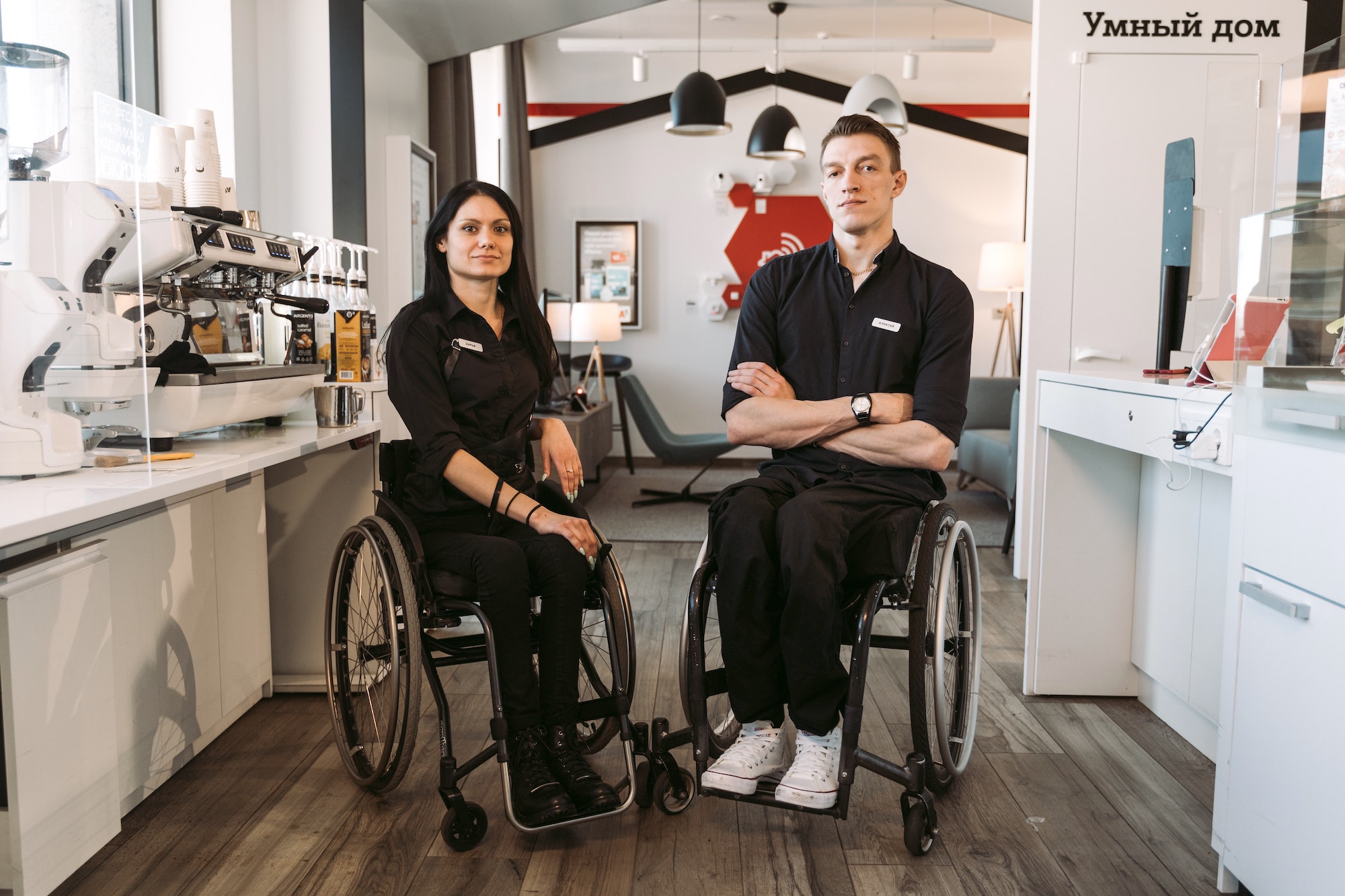
pwede po mag-apply ang stroke survivor? ty